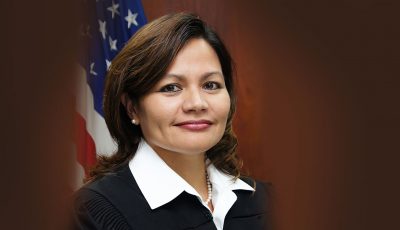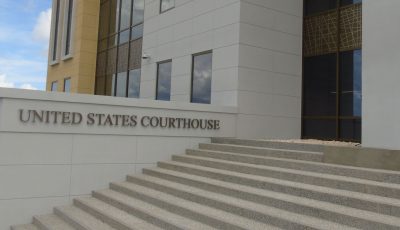Lawyer questions why Naraja continues to preside over CDA cases
The Commonwealth Development Authority is questioning why Superior Court Presiding Judge Robert C. Naraja has continued to preside over CDA cases considering that he is not only in dispute with CDA over $300,000 in debt, but his close family has been involved in litigation over millions of dollars with CDA for decades.
CDA, through counsel Jennifer Dockter, asked Naraja to disqualify from all CDA matters to ensure the integrity of the judiciary.
Dockter asserted that Naraja’s close family has an interest in the outcome of any similar CDA cases because the decisions the presiding judge renders could and likely would impact his family’s litigation with CDA.
“The combination of factors at play between the presiding judge and CDA’s cases creates just such an appearance of impropriety warranting his disqualification from all CDA matters,” the lawyer said.
The CDA counsel stated that the necessity of the motion to disqualify was not known until very recently when Naraja failed to disclose a conflict of interest with CDA over $300,000.
At the first appearance after the dispute arose, Dockter said, she inquired of Naraja to ensure he was actually aware of the events that arose between his wife, Frances, and CDA.
Dockter said Naraja indicated he was aware of the events leading to the conflict of interest.
Thereafter, the lawyer said, Naraja did not recuse himself and rather ordered CDA to file a motion to disqualify him or stated that it would not do so.
Dockter said Naraja has heard various cases involving CDA over the years and CDA did not object to his hearing the cases despite his immediate family’s long-standing litigation against CDA because of the professional respect CDA gave Naraja that he would maintain the separation of his professional duties and his personal relationships.
However, Dockter said, the tide began to shift in 2014 and Naraja began to make decisions that were confusing and were in a manner inconsistent with previous litigation.
Despite this shift, the lawyer said, insufficient evidence existed to question the impartiality of the presiding judge, until last year when CDA suspected the presiding judge’s family’s interests may have impacted his judicial decisions in other CDA cases.
Once his impartiality was questioned, CDA filed a motion to recuse the presiding judge.
Dockter said that motion to recuse was denied because the court held that CDA’s motion was untimely.
Dockter said recent events have increased the conflict between Naraja and CDA to such an extent that his disqualification is required and Naraja has not seen fit to disqualify himself but rather has ordered CDA to engage in the delicate and thorny process of discussing the presiding judge’s family’s debts and financial interests publicly.
Dockter cited six cases involving Naraja’s immediate family’s litigation with CDA.
The first case is CDA’s lawsuit filed in 1994 against Gloria Sablan and John T. Sablan for unpaid loans.
Gloria Sablan is the sister of Naraja’s wife, and she and her husband, John Sablan, are the in-laws of Naraja.
Dockter said CDA obtained a default judgment against the Sablans in 2004, but proceedings have continued in this matter until the present day with CDA attempting to collect $1.5 million owed as of Feb. 27, 2017.
When Associate Judge Joseph N. Camacho recused himself from this case in August 2016 because of a conflict, Dockter said the case then sat with Naraja without assignment to a new judge for months.
This prompted CDA to write a letter to Naraja, as well as to Chief Justice Alexandro Castro, on Nov. 16, 2016 in hopes of having another judge appointed.
Twelve days later, Naraja assigned the case to Associate Judge Teresa Kim-Tenorio who immediately recused herself based upon a conflict.
Dockter said the case sat with Naraja again without action for another few months.
CDA again wrote a letter to Naraja and Chief Justice Castro on Feb. 23, 2016, in hopes of having another judge appointed.
By that time, Dockter said, some of CDA’s attempts to collect on the judgment against Naraja’s wife’s sister and her husband had been pending for almost one year.
The second case is CDA’s lawsuit filed in 2004 against couple Joaquin V. Guerrero and Esther Guerrero and their business, Island Security Services Inc. for unpaid loans.
Joaquin Guerrero is the brother of Naraja’s wife.
CDA obtained a final judgment in November 2007, but proceedings have continued through present day with CDA attempting to collect on the judgment against the Guerrero couple in the amount of $583,832 as of March 15, 2017.
Dockter said that in December 2016, in an attempt to collect money long due to CDA, CDA applied for and received a writ of execution for any funds held in Bank of Hawaii related to Joaquin Guerrero.
Dockter said that, on Dec. 22, 2016, Bank of Hawaii sent a letter to CDA explaining that the bank received the writ of execution on the afternoon of Dec. 5, 2016 and while processing it but before they had seized the funds in question, on the morning of Dec. 6, Naraja’s wife, Frances, withdrew the funds in the form of eight cashier’s checks, all in her name, plus $6,093 in cash.
When Bank of Hawaii realized what had occurred, it immediately placed a stop payment order on the cashier’s checks and contacted Mrs. Naraja asking her to promptly return the checks and cash.
Dockter said despite the request from the bank to return the money and checks, Mrs. Naraja attempted to negotiate one of the cancelled checks.
On Dec. 30, 2016, counsel for CDA wrote a letter to Mrs. Naraja asking her to return the cash and checks and CDA would place the money with the court to permit the court to determine ownership of the funds.
Dockter said Mrs. Naraja did not return them and her counsel wrote a letter on Jan. 4, 2017, asserting that the money seized by CDA was in fact her property.
She said Mrs. Naraja also threatened possible lawsuit against CDA.
After obtaining a writ of execution to seize the currency and cashier’s checks from Mrs. Naraja, CDA successfully recovered the cashier’s checks which CDA caused to be deposited with the court.
Dockter said the $6,000 withdrawn by Mrs. Naraja was never recovered by Bank of Hawaii or CDA because it had been “dissipated” while in Mrs. Naraja’s possession.
Dockter said Mrs. Naraja suggested additional legal disputes between Mrs. Naraja and CDA because of CDA’s attempts to recover the money from her.
Dockter said litigation between CDA and Mrs. Naraja and the in-laws is now a certainty.
The third case is CDA’s lawsuit in 2004 against former governor Lorenzo I. Guerrero, who was later substituted by the estate of Lorenzo I. Guerrero, and Matilde V. Guerrero for unpaid loans.
Lorenzo and Matilde Guerrero are Judge Naraja’s father-in-law and mother-in-law.
CDA obtained two judgments totaling $720,000.
Proceedings have continued through present day with CDA attempting to collect on the judgments.
In June 2009, CDA applied for a writ of execution in the 2004 case to seize and sell property mortgaged to secure the loan to the Guerreros.
Dockter said prior to the sale of the mortgaged property, Matilde Guerrero filed a motion to consolidate judgments, application to pay-off consolidated judgments, and motion to vacate or stay the writ of attachment.
Dockter said the motion was supported by a declaration of Mrs. Naraja, who is the daughter of the defendants.
Judge Naraja’s mother-in-law’s motion was untimely denied and litigation continues with CDA attempting to collect the large deficiency judgment.
Dockter also cited two cases entitled CDA v. Angyuta Shipping Co. involving slightly different defendants. One was initiated in 2003 and the other was initiated in 2004.
Default and summary judgments were secured by CPA in a piecemeal fashion against all the parties by December 2011.
In the 2003 case, as of November 2016, defendants owed $2.6 million. In the 2004 case, as of November 2016, defendants owed $1.0 million. Proceedings have continued through present day in both cases with CDA attempting to collect on the judgments.
In July 2016, CDA filed a motion to disqualify Naraja from the Angyuta matters. CDA identified the conflict for Naraja was his family’s litigation against CDA and his simultaneously presiding over other CDA matters.
Dockter said the Angyuta order will certainly benefit Naraja’s brother-in-law, sisters-in-law, mother-in-law and perhaps his own wife as CDA attempts to continue to collect on judgments against them.
Dockter said the motion was denied on Dec. 14, 2014.
Dockter said the writ of execution in Naraja’s brother-in-law’s case, CDA vs. Island Development and others, was served on Bank of Hawaii on afternoon of Dec. 5, 2016 and Mrs. Naraja withdrew all funds and closed the account in question on the morning of Dec. 6, 2016.
CDA was notified of Mrs. Naraja’s conduct and the bank’s attempt to recover the funds from Mrs. Naraja, as of that time unsuccessfully, on Dec. 22, 2016.
CDA actively attempted to recover the funds from Mrs. Naraja through at least Jan. 5, 2017.
Dockter said the close, immediate family of Naraja is involved in long-standing, contentious litigation with CDA: his wife’s sister and her husband, his mother-in-law and the estate of his father-in-law, and his wife’s brother and his wife.
And now, Dockter said, Naraja’s wife is involved in a dispute with CDA over more than $300,000.
The lawyer said Naraja has issued orders in other CDA cases in a manner, which is detrimental to CDA and beneficial to debtors, including to multiple members of his family.
“Even when impartiality actually exists in the mind of the judge in question, justice requires the appearance of impartiality to engender confidence in the justice system in the mind of the public,” the lawyer said.



























